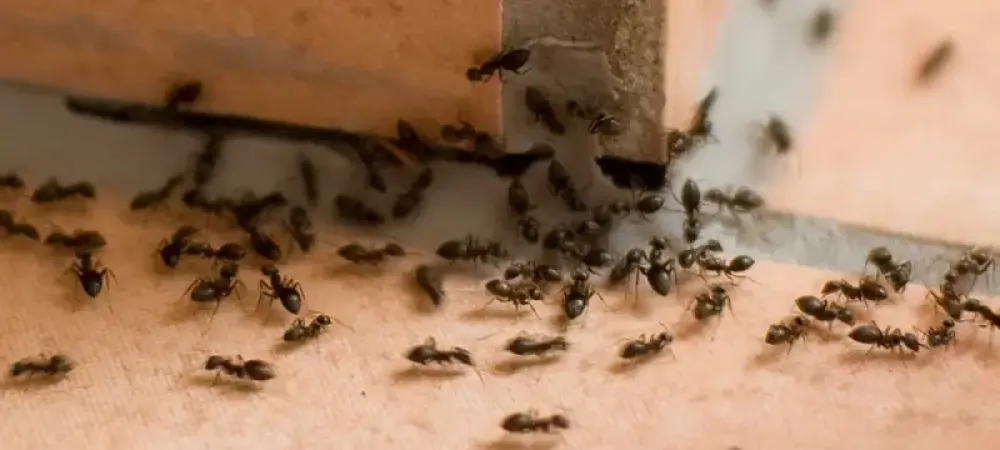Skipping seasonal pest control in North Carolina leads to significantly higher costs through structural damage, health risks, and emergency treatments. Regular preventive pest management costs 3-5 times less than reactive pest elimination and property repairs, especially with NC’s year-round pest activity and humid climate that accelerates infestations.
What is Seasonal Pest Control?
Seasonal pest control is a proactive approach to pest management that involves scheduled treatments and inspections throughout the year, targeting specific pests during their most active periods. Rather than waiting for an infestation to occur, this strategy focuses on prevention by addressing pest activity patterns, breeding cycles, and seasonal migration behaviors.
In North Carolina’s diverse climate zones, seasonal pest control typically includes spring preparation for emerging insects, summer management of peak pest activity, fall prevention of overwintering pests, and winter monitoring for indoor invaders. This comprehensive approach recognizes that different pests pose threats at different times of the year, requiring targeted interventions to maintain effective protection.
The process involves regular property inspections, strategic application of treatments, habitat modification, and ongoing monitoring to catch potential problems before they become expensive infestations. Professional pest control services tailor these programs to local pest pressures, weather patterns, and property-specific vulnerabilities.
Key Benefits of Regular Pest Management
1. Significant Cost Savings Over Time: Regular seasonal treatments typically cost $200-400 annually, while emergency pest elimination can range from $800-3,000 per incident. Structural repairs from termite damage alone average $8,000-12,000 in North Carolina, making it critical to learn how to prevent them. Preventive care eliminates the need for costly emergency interventions and protects property value through early detection and treatment.
2. Property Protection and Structural Integrity: Consistent pest management prevents wood-destroying insects like termites and carpenter ants from causing extensive structural damage. Regular inspections identify vulnerable areas before pests establish colonies, protecting foundations, support beams, and wooden structures that are expensive to repair or replace.
3. Health Risk Reduction: Seasonal pest control reduces exposure to disease-carrying pests like mosquitoes, ticks, and rodents. This proactive approach minimizes health risks from pest-borne illnesses such as Lyme disease, Rocky Mountain spotted fever, and West Nile virus, which are prevalent in North Carolina and can result in significant medical expenses.
Common Pest Threats in North Carolina
Spring Pests: Emerging Invaders
- Description: Termite swarmers, carpenter ants, and overwintering pests become active
- Best prevention for: Foundation protection and early colony elimination
- Risk level: High structural damage potential if left untreated through summer
Summer Pests: Peak Activity Period
- Description: Mosquitoes, wasps, fire ants, and various flying insects reach maximum populations
- Best prevention for: Health protection and outdoor space usability
- Risk level: Maximum disease transmission and sting/bite incidents
Fall Pests: Overwintering Preparation
- Description: Rodents, stink bugs, and cluster flies seek indoor shelter
- Best prevention for: Preventing indoor infestations during winter months
- Risk level: High indoor contamination and winter comfort issues
Winter Pests: Indoor Invaders
- Description: Mice, rats, and stored product pests exploit heated indoor environments
- Best prevention for: Food contamination prevention and property sanitation
- Risk level: Moderate to high depending on entry point availability
How Delayed Treatment Increases Costs
Step 1: Initial Infestation Establishment- When seasonal treatments are skipped, pest populations establish breeding sites and expand unchecked. Small colonies grow exponentially, making elimination more complex and expensive than early intervention would have been.
Step 2: Secondary Damage and Complications- Established pest populations cause progressive damage to structures, contaminate stored goods, and create health hazards. Termites can cause thousands in structural damage within months, while rodents create fire hazards through wire chewing and contaminate large quantities of stored food.
Step 3: Emergency Treatment and Repair Costs- By the time homeowners notice significant pest activity, professional elimination requires intensive treatments, structural repairs, and often temporary relocation during fumigation. These emergency responses cost 5-10 times more than preventive seasonal treatments and may require multiple service visits to achieve complete elimination.
North Carolina-Specific Pest Considerations
Humid Subtropical Climate Impact: North Carolina’s high humidity and mild winters create ideal conditions for year-round pest activity. Unlike northern states where cold temperatures provide natural pest population control, NC’s climate allows continuous reproduction cycles, making consistent seasonal treatment essential for effective management.

Regional Pest Pressure Variations: Coastal areas face different pest challenges than mountain regions, with coastal properties dealing with higher moisture-related pests and inland areas experiencing different seasonal patterns. The Piedmont region’s urban development creates unique pest corridors that require specialized seasonal approaches.
Hurricane and Storm Recovery: Post-storm conditions create ideal breeding environments for mosquitoes and provide new entry points for various pests. Seasonal pest control programs include storm damage assessments and rapid response treatments to prevent pest population explosions after weather events.
Common Mistakes to Avoid
Mistake 1: Treating Only Visible Problems- Many homeowners wait until they see obvious pest activity before seeking treatment. By this point, hidden populations are often well-established, requiring more extensive and expensive treatments. Solution: Implement year-round monitoring and preventive treatments based on seasonal pest patterns rather than visible activity.
Mistake 2: DIY Treatment Over Professional Service- Store-bought pest control products often provide temporary relief without addressing root causes or breeding sites. Incorrect application can actually worsen problems by scattering pests to new areas. Solution: Work with licensed professionals who understand local pest behavior and can provide targeted, effective treatments.
Mistake 3: Inconsistent Treatment Schedules Skipping treatments during perceived “low activity” periods allows pest populations to recover and establish new breeding sites. Even winter months require monitoring and treatment in North Carolina’s mild climate. Solution: Maintain consistent seasonal treatments year-round, adjusting intensity based on seasonal pest activity rather than eliminating services.
Frequently Asked Questions
What pests are most active during different seasons in NC?
Spring brings termite swarmers and emerging ants, summer peaks with mosquitoes and wasps, fall sees rodents and overwintering insects seeking shelter, and winter maintains activity from indoor pests like mice and stored product insects due to NC’s mild climate.
Can I skip winter pest control treatments in North Carolina?
No, North Carolina’s mild winters maintain pest activity year-round. Rodents remain active, and many insects survive in protected areas. Winter treatments prevent spring population explosions and address indoor pest problems that peak during heating season.
Professional Pest Control in North Carolina
Protecting your North Carolina property from costly pest damage requires expertise in local pest behavior, seasonal patterns, and effective treatment strategies. Triangle Pest Control’s licensed professionals understand the unique challenges of NC’s climate and provide comprehensive seasonal pest management programs tailored to your specific property needs.
Don’t wait for expensive pest problems to develop. Contact Triangle Pest Control today for a free consultation and learn how our seasonal pest control programs can save you thousands in potential damage while keeping your family safe and comfortable year-round.
Call 919-552-1548 to schedule your seasonal pest control assessment.


